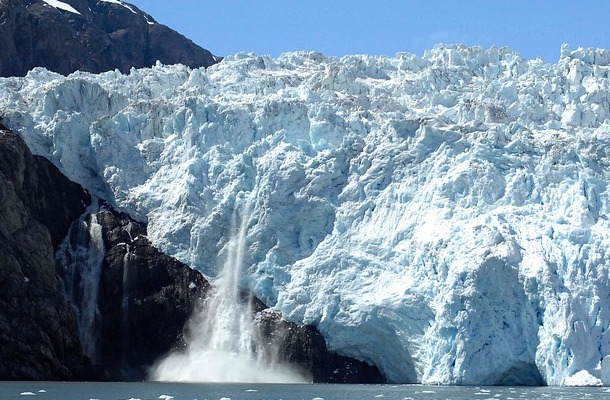Climate & energy – appeasement does not work

The current chaos around climate and energy policy brings to mind George Santayana’s caution that: “Those who cannot remember the past are condemned to repeat it”. That is exactly what we are witnessing, albeit with far more profound implications even than the advent of the Second World War.
In November 1936, Winston Churchill, concerned at the dangers posed by the Third Reich, warned the House of Commons about the refusal of the British establishment to face up to reality:
“They go on in strange paradox, decided only to be undecided, resolved to be irresolute, adamant for drift, solid for fluidity, all-powerful to be impotent……Owing to past neglect, in the face of the plainest warnings, we have now entered upon a period of great danger ….. The era of procrastination, of half-measures, of soothing and baffling expedients, of delays, is coming to a close. In it’s place we are entering a period of consequences….. We cannot avoid this period, we are in it now …..”
Prime Minister Neville Chamberlain was not to be diverted from the appeasement path, returning from Munich in September 1938 waving his “peace in our time” paper signed with Hitler. The rest is history; the war started a year later.
So it is with the National Energy Guarantee (NEG). Conjured out of nowhere, with experts press-ganged to provide underwhelming technical credibility, warning lights flashed red when the little Hitlers of the Coalition’s right wing, such as Craig Kelly, Barnaby Joyce and Tony Abbott himself, gave effusive support. Most media commentators demonstrated their profound ignorance by instantly heralding the NEG as the answer to our energy prayers, despite a total absence of detail and minimal reference to the climate implications.
For climate is the key. Until climate drives energy policy, there will never be the certainty for investment, reliability, security and affordability, that everyone craves.
Kelly gave the game away by letting slip the magic word “backloading”. Put simply, to satisfy these little Hitlers, when detail of the NEG does emerge, it will guarantee business as usual for energy supply, ramping up coal and CSG, with any attempt to reduce carbon emissions in line with our wholly inadequate Paris Agreement commitments, left until the last possible minute prior to the 2030 deadline. The rationale being that the cost of compliance by then will be greatly reduced due to technology improvements.
In that one word, the government has completely abrogated its first responsibility to safeguard the people and their future wellbeing, for everything about this “elegant” solution is wrong.
Many parliamentarians still do not believe human-induced climate change even exists; a view closely correlated with massive political donations from the fossil fuel industry. For a country whose wealth has been based on the sensible application of science and technology, a parliament so corrupt and lacking in basic scientific, technical and economic understanding, and commonsense, is the greatest threat to our future security and prosperity.
In the real world, beyond the Canberra goldfish bowl, human-induced climate change is accelerating far faster than expected. The unprecedented hurricane season in the Atlantic, devastating bushfires in California and extreme heat in many parts of South Asia are only the most recent portents of what is to come.
The lower Paris objective, of limiting temperature increase to 1.5oC above pre-industrial levels, is no longer achievable. Staying below the upper objective of 2oC requires a halt to the burning of fossil fuels today. That will obviously not happen, but the more carbon that is pushed into the atmosphere, the greater the overshoot beyond 2oC and the greater the catastrophic conditions we create for ourselves. For Australia, as one of the hottest and driest continents, this is extremely dangerous, particularly for our rural communities and for Northern Australia.
The climate impact of carbon emitted today does not manifest itself for years to come. In these circumstances, to seize upon “backloading” as a key policy plank, deliberately encouraging Adani and other Galilee Basin coal mines, the expansion of domestic coal-fired power, and CSG which is worse than coal from a warming perspective, is the height of irresponsibility, for it would automatically lock-in catastrophic outcomes. Emissions have to be reduced now, not a decade hence. Lower energy costs will only come from a major investment in renewables, improved energy efficiency and changing social values, not from massively expanding fossil fuels and continuing to subsidise them by refusing to price carbon.
For the last twenty years, beginning with John Howard, both major parties have continually played the appeasement card on climate policy. Howard signed the Kyoto Protocol in 1997, and as a result triggered the first design of an Australian emissions trading system, completed in 1999 (see disclosure below). Despite strong business support, he shelved it when George W Bush refused to sign Kyoto. Business interest in climate action evaporated and fossil fuel industry resistance grew. To appease the fossil fuel lobby, every proposal subsequently has been used as a starting point to further ratchet down sensible climate policy ambition, the most recent example being the Finkel Review.
In good faith, Alan Finkel put forward an honest proposal for a politically acceptable climate and energy policy, albeit far from ideal. It was simply taken as the starting point to be ratcheted down again to the magical vision of the NEG.
Those who have any genuine concern for the future of this country need to call out climate appeasement for what it really is, namely the destruction of our security and prosperity by a bunch of ignorant, self-serving ideologues who have no regard for the Australian people they so earnestly claim to represent.
Appeasement never works. The devastation wrought by Hitler pales into insignificance compared with the risks to which we are now exposed by the government’s refusal to adopt sensible climate policy. The period of consequences is upon us and there are certainly no Churchills in sight.
—————-
(Disclosure: Ian chaired the AGO Experts Group which designed this first emissions trading system for Australia under the Howard government in 1998/99)
This article first appeared in Renew Economy on 28 November. It is republished here with the kind permission of the author.
Ian Dunlop is a senior Advisory Board member of the Breakthrough National Centre for Climate Restoration. He was formerly an energy industry executive and CEO of the Australian Institute of Company Directors. He co-wrote “What Lies Beneath: the understatement of existential climate risk”.












Alan Douglas
December 5, 2017 at 8:55 am
I am amazed that such a well constructed analysis as this could pass without a comment. Ian Dunlop has shown over the years that he is a deep thinker, well read and knows what he is talking about. I, for one am worried about the kind of world we are leaving for our grandchildren. When the leaders of our world are more intent on posturing than doing anything more than window-dressing about climate change it’s time to despair about humanity. Many scientists are now saying it’s too late to do anything constructive but I think it’s never too late – there is always room for hope. Let’s hope some of our pollies are reading this article.
Max Thomas
December 10, 2017 at 8:06 am
Chamberlain’s appeasement of Hitler was consistent with a large body of public opinion. It can be argued that it was an attempt to buy time for a nation that was war-weary and militarily unprepared. Comparison of democratically elected representatives in the Parliament of Australia to Hitler and his lunatic Nazis is not only irrelevant, but it is the kind of rhetoric adopted by those who reject persuasion in favour of imposed authority. Climate change being in this case the ‘just cause’ by which the suspension of democratic principles may be warranted.
Hitler projected responsibility for the severe economic problems of Germany onto unfortunate minorities. To suggest that Nazi psychopathy and the criminal insanity of genocidal Nazi solutions ‘pale into insignificance’ betrays a worrying disregard for history. The sequelae of those events have so profoundly reshaped the geopolitical world, especially the energy-rich Middle East, that it would be impossible to overstate their significance.
The Nazis used ‘science’ to support and implement their ideology. The worst of this science was unethical and corrupt in that the work was carried out without the consent of the subjects and the outcomes were predetermined. However, the best of Nazi science was adopted by the allies without delay after the war. Not all of this science has been used in the best interests of humankind, but that is the tragedy of our condition.
Science has established anthropogenic climate change beyond reasonable doubt, but science is not absolute; it is inherently sceptical. The impacts of climate change have not been and probably cannot be defined to a level of resolution that policies on health, education, trade, foreign affairs, transport, agriculture, water, defence, energy and immigration, for example, can be entirely based on premises that might well be unreliable. The economic, social and political consequences of gross misjudgements in these key policy areas cannot be described as insignificant.
“We cannot avoid this period, we are in it now.” Churchill’s prophetic words were uttered in the face of imminent and predictable danger. He also said that ‘scientists should be on tap, but not on top’. No doubt he was talking about the role of science to inform the difficult judgements that leaders have to make in trying to reconcile competing imperatives which defy objective measurement.
Ian Dunlop
December 12, 2017 at 6:46 pm
Max
Thanks for your critique, and apologies for slow reply – been out of email contact for some days.
I am acutely aware of the history, and I do not use the Nazi analogy lightly. Consider the following:
We have spent 30 years trying to persuade the Establishment of the urgency to address climate change, and achieved nothing in any meaningful sense – carbon emissions here and overseas are still increasing at worst-case scenario levels. The NEG is only the latest in a continuing degradation of any serious attempt to face up to the issue. Our political system has for years been under the domination of the fossil fuel industry, in large part influenced by generous political donations and more nefarious methods employed by a multitude of related think tanks. To the point that no amount of science and evidence will ever convince key right-wing political players that human-induced climate change is anything other than “crap”, in the immortal words of our erstwhile leader. Denial is also commonplace among the “eminence gris” of corporate Australia, despite much rhetoric to the contrary.
A “large body of public opinion” has been prepared to go along with this denial, and leadership failure, as fossil fuel interests, here and overseas, try to buy themselves more time before the inevitable demise of their industry by locking in as many new projects as possible.
The result of this inaction has far wider implications than we are being told officially. As you say, climate science is not absolute. However, the fundamental greenhouse gas warming mechanism is not in doubt – the uncertainties lie in the speed and extent of its impact. On that count, it is clear that the impacts have been badly underestimated. The rationale for this view is summarised in three recent reports published by my colleague David Spratt and myself over the last 18 months, based on work going back over a decade:
Climate Reality Check: After Paris, Counting The Cost
Disaster Alley: Climate Change, Conflict & Risk
What Lies Beneath: The Scientific Understatement of Climate Risks
They are available at: https://www.breakthroughonline.org.au/publication
This is backed up by increasingly urgent warnings from leading scientists globally, as extreme events intensify.
It is not alarmist nonsense, but a sober, objective view of the risks we face.
The bottom line is that we are most unlikely to prevent average global temperatures rising way above the Paris 2degC upper limit, which takes us into the extremely dangerous climate change arena. That is, unless we take emergency action now, akin to a wartime restructuring of our economies. The current UNFCCC process is not going to solve this problem.
The consequences globally, and here, of not taking that action are far worse than anything the Nazis aspired to, with potentially massive reductions in global population which we are locking in with today’s policies. We increasingly know the implications for the wider policy areas you mention. Yes, there may be misjudgements, but the implications of current inaction are much worse.
This is about global risk management, informed by the science and evidence. On that score, we face an imminent and predictable danger now. The context is of course different from 1939, but the irresponsibility of those preventing action is akin to that of the Nazis. This is a crime against humanity such as we have never seen before. I would suggest the analogy is indeed appropriate.
Alan Stevenson
December 10, 2017 at 9:40 am
The climate change argument brings out emotions that are best kept under control. The comparison of some of our pollies as little Hitlers may have been a bit strong. However, when I look at what has been achieved in Singapore under a benevolent dictatorship I do wonder if we need such a leadership even if only in the short term to drag us out of the mess we have created. True, the science of climate change is not an exact one, but the overwhelming accepted knowledge so far is that if we are going to keep the world habitable we need to act quickly.
Max Thomas
December 13, 2017 at 10:01 am
To dispose of any suggestion that I do not accept the science, I published warnings about the potential impact of climate change in guidelines for recycled water irrigation which I prepared for EPA Victoria almost 30 years ago. I agree, there’s no point repeating facts over and over to people who have closed their minds. Dietrich Bonhoeffer, a most courageous critic of Nazism, concluded that people of this mentality will ultimately dismiss facts as inconsequential.
Bertrand Russell was onto it when he said ‘people don’t want science, they want certainty’ and that is the currency used by populist politicians to purchase votes. If people are being asked by distrusted politicians to forego present comfort and security, albeit illusory, for uncertain and ill-defined future benefits, nobody ought be surprised if they hesitate to buy in. This is about the communication of science, so we need to get the science of communication right. As for benevolent dictators, Alan, the dustbin of history is full of their detritus.
Ian Dunlop
December 13, 2017 at 11:21 am
Max. I certainly did not mean to imply you do not accept the science!
Leadership means a preparedness to honestly articulate the challenge we face and possible ways forward. Sadly that is in short supply to put it mildly, not least because of all-pervasive short-termism and the politicisation of the public service. An urgent need to reclaim democracy.
Max Thomas
December 13, 2017 at 1:47 pm
I think we’re in furious agreement about the politicisation of the public sector, Ian. The most unfortunate aspect is that political gravity pulls science reluctantly into its sphere of influence with inevitable distortion. Our constitution reflects the terrifying prospect of colonial armies facing each other across the Murray with the American civil war still fresh in mind. The ‘glue’ that holds our federation together is a very sticky concoction, intended to resist the vagaries of whim and fashion.
We have to acknowledge that the Deputy Prime Minister has been returned with a convincing majority. This can be seen as a democratic signal showing that the forces of change have been misdirected or are insufficient to overcome the forces of reaction. It appears that political change has to precede the economic and social adjustments that science tells us are so urgently necessary. ‘Beyond Federation’ might be a good place to begin the search for ways to bring about peaceful change by appealing to what Hawke described as the character and calibre of the Australian people:
https://www.openforum.com.au/?s=beyond+federation
Max Thomas
December 15, 2017 at 9:08 am
…and we must always remember that liberty is much more difficult to regain than it is to lose.